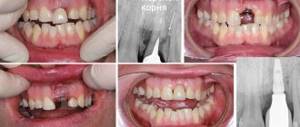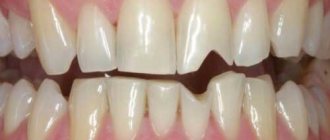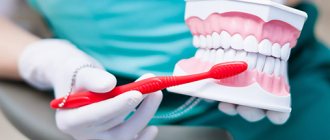One of the fundamental principles of modern dentistry is pain-free dental treatment. However, most adult patients feel nervous while sitting in the dentist's chair, and some are completely unable to overcome the horror that grips them in the dentist's office. When it comes to the treatment of baby teeth, the problem becomes especially acute. The need to visit the dentist can cause real hysterics in a child. If you don’t help your child cope with his fears, in adulthood he will constantly put off visits to the dentist. How to overcome childhood dental phobia?
Personal experience.
Not all dentists are ready to seek an approach to children. Doctors at public clinics work on a whim - appointments are limited in time, they do everything quickly and efficiently, without friendliness or comfort. Pain during treatment leads to the formation of a persistent fear of dentists.
Rodikova Tatyana
“Soviet dentistry perpetuated fear of dentists among adults. The grinding sound of a drill, treatment without injections... But today there is nothing like that anymore. Modern technologies mean treatment without pain, so, dear parents, do not broadcast your fears to your children! A comfortable and pleasant treatment awaits them. Especially in "Azabuka".
Many parents find out in advance what is harmful and beneficial for the baby, and do not allow such situations. But if children have already begun to be afraid of dentists, then they need to deal with fears consistently and carefully.
Why is a child afraid to have his teeth treated?
When you meet with a dentist, the work of the central nervous system (CNS) changes: a chain reaction starts - the brain converts sound and image into an alarm signal. And then the signal is fixed in memory. When the situation repeats, the body begins to react accordingly even to the kindest dentist - the heartbeat quickens, sweating increases.
It is noteworthy that all children are afraid of pain. However, from the age of three, children develop fear of the sight of blood. Another reason why a child is afraid to have dental treatment is the fear of unfamiliar people and surroundings.
How to teach a child not to be afraid of the dentist: advice from psychologists
The most common age when parents begin to look for an answer to the question “what to do – the child is afraid of doctors” is 3 years. At this age, not all children obey authority - children cannot be restrained by force or forced to undergo treatment. And if you do not rid the child of fear, the problem will remain relevant at 6 years old, at 9 and at 13. By this time, the consequences of ignoring dentists are very serious - until the molars are removed.
Based on the experience of parents and advice from psychologists, we have collected the best recommendations on how to get your child used to going to the dentist.
Visiting dentists – every 6 months
To maintain oral health, you should visit your doctor twice a year. Only a few follow this rule, so the child ends up in the dentist's chair with toothache, caries, and damaged crowns.
Following the schedule of systematic techniques guarantees:
- meeting a doctor;
- calmness during examination;
- timely treatment;
- control and professional supervision.
Building trust
A stranger in a white coat with strange instruments and a mask is scary. A dentist who calls a young patient by name and clearly talks about the equipment and medical procedures inspires trust.
An excellent bonus of professional children's dental clinics is adaptation techniques, where the child is introduced to the doctor's work and tools in a playful way. In specialized medical centers, every doctor is a psychologist and can easily come to an agreement with the most stubborn little one. A few adaptation techniques, and fear disappears forever.
Plaksina Margarita
“Doctors at Azabuka undergo mandatory training - they are proficient in modern psychological methods of communicating with children. We find a language with all patients."
Choosing the right doctor
Good dentists master the art of communication. They come up with interesting stories, choose pleasant words, and find contact with everyone who comes to the reception. Preschoolers need fairy tales, older children need seriousness, teenagers need a special approach. The child is looking for his own ideal doctor, and the task of adults is to help in the search.
Preparing for your appointment
Many parents know what and how to tell their child in order to motivate him to go to the dentist. “Teeth” fairy tales, funny cartoons, games, and toys are used. If it is not possible to build a dialogue, then you need to act professionally.
In this case, it is also worth turning to dental adaptation and trusting the doctors.
An honest story about the upcoming treatment
Psychologists distinguish between mother's and father's approaches when communicating with a child. Dad explains through logic, reason; mom - through emotions, feelings. Any path is correct.
It is wrong to remain silent about the upcoming procedure, to deceive, to be cunning, to lure the child to an appointment, in the hope that they will not “get away.”
Dolotova Marina
“An honest story is good, but it is better to entrust this conversation to the dentist. The doctor will perfectly explain to the child the intricacies of the upcoming treatment without the scary words “injection”, “drilling”, “instruments”. Parents don’t always succeed in this, and children get even more scared.”
Making an appointment for a child's regime
It is easier to accustom children to the dentist when they are cheerful, well-fed, and well-rested. If the baby is tired and hungry, you should not expect calmness and good reactions from him. Early morning and late evening are not suitable at all. Other intervals should be assessed from the point of view of children's routine, well-being, and comfort.
Together - to the office!
Children become especially afraid of the dentist when they stay with him one-on-one. Recommendations to “leave the office” are considered harmful and increase the fears of young patients. Even teenagers feel calmer when a loved one is nearby.
Gifts against fears
Many people do not like material incentives, but sometimes they are necessary. In this case, it is better to convey encouragement through the doctor. At the end of the appointment, the doctor will personally reward the most courageous, patient and courageous patient!
This approach comforts, gives positive emotions, and helps fight fears for the sake of the desired gift. Gradually, positive behavior is reinforced - going to the dentist brings joy, not horror.
Too much treatment is bad
Having conquered the child’s fear and persuaded him to come to the appointment, it is easy to make a mistake and ask the doctor to cure all his teeth in one visit. Excessive time in the chair aggravates the baby's panic - next time it will be more difficult to convince him to go to the doctor.
Rodikova Tatyana
“We discourage parents from complex treatment. This is bad for the child - his peace and comfort. If you really need to treat several teeth in one appointment, you should think about sleep treatment or high-quality sedation.”
Anesthesia as salvation
Treatment under sedation is an excellent solution for fearful children. Nitrous oxide will relieve stress, eliminate fear, and help you relax during your dentist appointment. A positive perception will help the child evaluate the doctor’s work differently, and the fear will gradually disappear.
Advice for parents is the first step in overcoming your child’s fear of dentists. But what to do if a child is afraid of the dentist and nothing helps? In this case, close cooperation between doctors and the mother and father of the young patient is necessary. The fight against fears is carried out consistently - one step at a time. The child is introduced to the clinic, doctors, taught how to brush teeth on models and treat animals. They tell him fairy tales about funny characters and show him cartoons. Gradually, trust and positivity are formed, the child sees that dental treatment is not scary, and the attitude towards doctors becomes normal.
Rule #5. Going to the dentist is a good habit for the whole family!
Visiting the dental clinic is a very good habit! For both adults and children. You can go to the doctor not only to cure a bad tooth, but also to prevent diseases. For example, to have your teeth professionally cleaned or just for an examination.
If you visit the dentist with your child at least once a year, you will make this a habitual procedure for him. And regular checks of the condition of the oral cavity will really save you and your baby from painful sensations, because it is better to cure small caries at an early stage than to suffer from pulpitis.
At what age should children be taken to the dentist?
Experts say: the sooner you start doing this, the better it will be. “You need to see a dentist every 6 months, even if there is nothing bothering you and the parents think everything is fine. In addition, such visits to the doctor remove the main fear - the fear of the unknown, notes Alexander Chernykh. “The child will know from an early age that the dentist helps, he is a friend and he can be trusted.”
But if you put off visits to the dentist until the last minute and bring your child to the dentist in case of acute pain, the child’s reaction may be unpredictable. Most likely, he will get the same negative experience from treatment and pain that will poison subsequent visits to the doctor.
Recommendations for adults
- Choose a good doctor. Agree with him that during the first visit there will be no treatment, but simply a tour of the office and an introduction.
- Positive emotions. Before the dentist, visit a pizzeria, a movie, or go to the park with your fidget. Let the child come to the doctor with positive emotions.
- Well-fed means accommodating. Before taking your child to the dentist, first feed him well.
- Do not overdo it. Do not ask your dentist to treat all your teeth at once in one visit. It will be difficult for the baby to sit in one place for a long time. It is better to go to the doctor several times over 1-2 weeks than just once, but staying in his office for several hours in a row.
- Support your baby. Do not leave the dental office if the restless person asks to stay nearby.
- Try not to worry yourself , since everything you feel can be passed on to the baby.
- Be sure to praise your child when leaving the dentist's office. Tell him how much you love him, how proud you are of him.
The video provides additional information on how to teach your child not to be afraid of dentists.
Types of fears
Three types of fear should be distinguished:
- Anxiety. An inexplicable feeling of excitement appears inside, sweating increases, and the heartbeat quickens. The child begins to feel that something bad is about to happen.
Why this strange sensation suddenly arises, he himself cannot understand, the unknown frightens him.Sitting in the corridor and hearing a rattling sound coming from the office, he begins to worry whether the doctor will hurt him? I want to leave this unpleasant place as soon as possible.
- Fear. The baby is afraid of the pain that occurs during treatment. It begins to seem to him that the doctor wants to offend him. Fear, unlike anxiety, is associated with a specific situation that causes fear.
- Phobia. This is uncontrollable fear.
Occurs after an unsuccessful visit to the dentist. The latter once hurt or scolded for disobedience. There is negativity left in the subconscious, which pops up on the way to the clinic. Panic fear appears, called “dentophobia” in medicine. The child is afraid that everything will happen again.
The main mistakes of parents
Almost all causes of dental phobia can be united by one common characteristic - incorrect behavior of adults.
Dentophobia
The most common mistakes parents make include the following:
- the child “gets to know” the doctor not under ordinary circumstances, but when a serious problem arises (for example, toothache);
- lack of motivation for treatment - parents do not tell their child how important it is to go to the dentist and maintain dental health;
- the use of violence, blackmail or threats - when a child needs to have a tooth pulled, adults often forcefully hold him in place or scare him with scary things;
- a visit to the doctor is carried out at an uncomfortable time for the child - for example, when he is used to sleeping or playing;
- deception of parents - on the eve of the procedure, the little patient is told that nothing special will happen to him, but in fact he will be in severe pain.
Introducing a child to a dentist
Reviews
Dentophobia is a common phenomenon, however, and it can be dealt with. There are many recommendations given above, following which you can help your child overcome his fear and teach him to take care of his teeth and oral cavity every day.
If you have any other tips to offer, please don't hesitate. Write them below in the comments to this article.
If you find an error, please select a piece of text and press Ctrl+Enter.
Tags toothache treatment
Did you like the article? stay tuned
Previous article
Teeth whitening Yotuel - a modern development according to European standards
Next article
What is a rubber dam and why is it needed in dentistry?
How to “agree” with a child?
It all depends on the reason why the child refuses treatment. Although all the reasons come down to one thing - fear (fear of a drill, of dental instruments, of a person in a medical suit, etc.), each individual case has its own source.
Fear of the drill . Convince your child that the only thing “scary” about a drill is the unpleasant sound it creates during operation. But in fact, it is a very useful tool for treating people, and many people who previously had no access to drills suffered from pain because there were no treatments for it. Compare the fear of a drill to something that a child can understand. For example, remind him that your cat is afraid of the vacuum cleaner because she thinks it sounds scary, but in fact it is a completely safe household appliance that helps keep the house clean.
Fear of pain . If a child has a severe toothache, his natural reaction will be to prevent any irritants so that the pain does not intensify. In particular, he will be against visiting a doctor, since during medical procedures the pain may become stronger. In this case, also provide clear comparisons. For example, mention a time when the child fell or otherwise injured himself. That the wound stopped hurting only after it was treated and it began to heal. The tooth will behave in the same way - it hurts because it asks for help. Without it, he will continue to be ill for a very long time, and without a doctor he will not be able to cope with this pain.
An experienced doctor will always be able to captivate the child and carry out the necessary manipulations.
Do the same with other fears: you need to let the child know that you are on his side. And that if he refuses to go to the dentist, you will not force him, but you really count on his sanity.
The following techniques will help both get your child to have his teeth treated and allow him to understand the need for this procedure:
- Show your child a diagram of the structure of a tooth (they can be found on the Internet). Show on the diagram exactly where the pain comes from, why it developed there, and what actions need to be taken to make the pain stop. For clarity, print out the diagram and put dots in the pulp area with a pencil - these will be microbes that are waiting for the right moment to spread even further - to where they can cause harm not only to the tooth, but to health in general.
- Tell us about the dangers that may await a child if the tooth remains untreated. This is a pain that will spread even deeper and deeper, then this tooth will have to be removed and an ugly hole will remain in this place.
- Turn your dentist into a hero. It is much easier to figure out how to treat the teeth of a 6-year-old child - the child is already familiar with various movie and cartoon characters and treats them very favorably. Tell the story that dentists are heroes sent into our world to kill evil and dangerous germs that chew on human teeth. Let the story be bright and colorful, you can even tell it as a story from your own past, when you also had a toothache, but a kind dentist saved you from germs.
- Offer a reward. This is an extreme, but quite effective measure. Offer your child, for example, a visit to an amusement park, an unscheduled trip to the cinema, or any other activity that interests the child. This should be just an activity or pastime - child psychologists categorically do not recommend rewards in their “pure form” (money, gifts).
The methods listed may be equally helpful or useless. It all depends on how deep the fear is in the child, and what specific circumstances caused it. But when a dental problem arises, as a rule, there is no time left to visit a child psychologist. What to do if all your efforts were fruitless?
Rule #6. Promise your child a reward after visiting the dentist
A simple and effective method is to promise your child to buy something for going to the dental clinic.
A surprise doesn't have to be expensive. But its presence will allow the baby to learn to endure unpleasant moments for the sake of reward.
If the child is small, before starting the procedure you can discreetly hand the toy to the dentist so that he can give it to him after the treatment. Thus, the child will perceive the dentist as a good doctor, almost like Aibolit.











